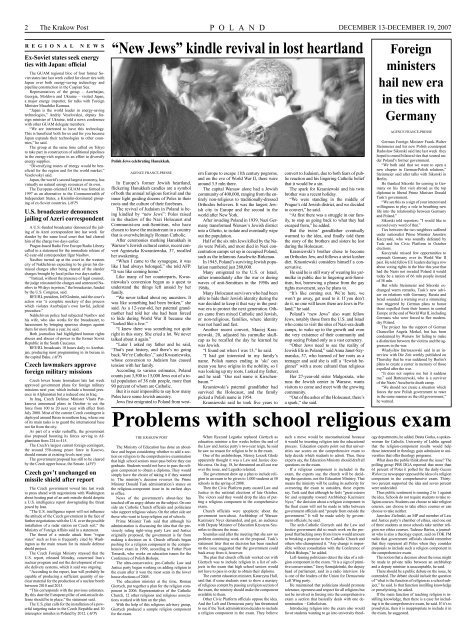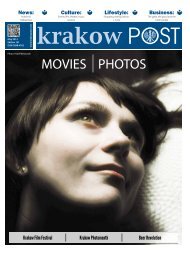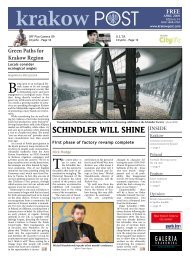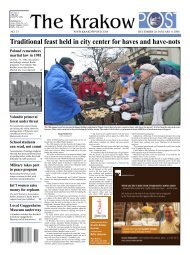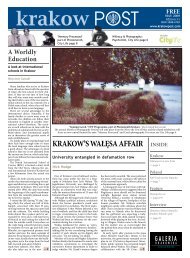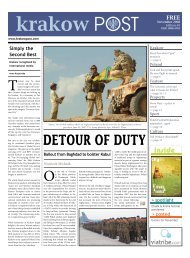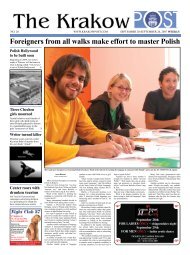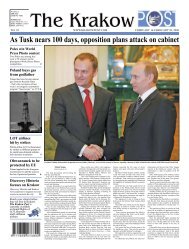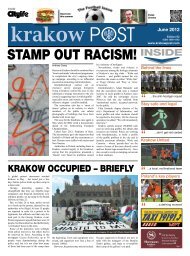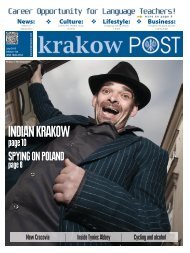Local superintendent may change face of educational ... - Krakow Post
Local superintendent may change face of educational ... - Krakow Post
Local superintendent may change face of educational ... - Krakow Post
Create successful ePaper yourself
Turn your PDF publications into a flip-book with our unique Google optimized e-Paper software.
2<br />
The <strong>Krakow</strong> <strong>Post</strong><br />
R E G I O N A L N E W S<br />
Ex-Soviet states seek energy<br />
ties with Japan: <strong>of</strong>ficial<br />
The GUAM regional bloc <strong>of</strong> four former Soviet<br />
states late last week called for closer ties with<br />
Japan over both energy-saving technology and<br />
pipeline construction in the Caspian Sea.<br />
Representatives <strong>of</strong> the group – Azerbaijan,<br />
Georgia, Moldova and Ukraine – visited Japan,<br />
a major energy importer, for talks with Foreign<br />
Minister Masahiko Komura.<br />
“Japan is the world leader in energy-saving<br />
technologies,” Andriy Veselovskyi, deputy foreign<br />
minister <strong>of</strong> Ukraine, told a news conference<br />
with other GUAM delegate members.<br />
“We are interested to have this technology.<br />
This is beneficial both for us and for you because<br />
Japan expands their technologies to other countries,”<br />
he said.<br />
The group at the same time called on Tokyo<br />
to take part in construction <strong>of</strong> additional pipelines<br />
in the energy-rich region in an effort to diversify<br />
energy supplies.<br />
“Diversifying routes <strong>of</strong> energy would be beneficial<br />
for the region and for the world market,”<br />
Veselovskyi said.<br />
Japan, the world’s second largest economy, has<br />
virtually no natural energy resources <strong>of</strong> its own.<br />
The European-oriented GUAM was formed in<br />
1997 as an alternative to the Commonwealth <strong>of</strong><br />
Independent States, a Kremlin-dominated grouping<br />
<strong>of</strong> ex-Soviet countries. (AFP)<br />
U.S. broadcaster denounces<br />
jailing <strong>of</strong> Azeri correspondent<br />
A U.S.-funded broadcaster denounced the jailing<br />
<strong>of</strong> its Azeri correspondent late last week for<br />
slander by the same local court that had cleared<br />
him <strong>of</strong> the charge two days earlier.<br />
Prague-based Radio Free Europe/Radio Liberty<br />
called in a statement for the immediate release <strong>of</strong><br />
42-year-old correspondent Ilgar Nasibov.<br />
Nasibov turned up at the court in the western<br />
city <strong>of</strong> Nakhchivan expecting to be given his dismissal<br />
charges after being cleared <strong>of</strong> the slander<br />
charges brought by local police two days earlier.<br />
“Instead, without the presence <strong>of</strong> legal counsel,<br />
the judge reinstated the charges and sentenced Nasibov<br />
to 90 days in prison,” the broadcaster, funded<br />
by the U.S. Congress, said.<br />
RFE/RL president, Jeff Gedmin, said the court’s<br />
action was “a complete mockery <strong>of</strong> due process<br />
which violates Azerbaijan’s own lawful, judicial<br />
procedure.”<br />
Nakhchivan police had subjected Nasibov and<br />
his wife, who also works for the broadcaster, to<br />
harassment by bringing spurious charges against<br />
them for more than a year, he said.<br />
Both journalists had highlighted human rights<br />
abuses and abuses <strong>of</strong> power in the former Soviet<br />
Republic in the South Caucasus.<br />
RFE/RL broadcasts 10 hours daily to Azerbaijan,<br />
producing most programming in its bureau in<br />
the capital Baku. (AFP)<br />
Czech lawmakers approve<br />
foreign military missions<br />
Czech lower house lawmakers late last week<br />
approved government plans for foreign military<br />
missions next year, which include a boosted presence<br />
in Afghanistan but a reduced one in Iraq.<br />
In Iraq, Czech Defense Minister Vlasta Parkanova<br />
announced plans in October to cut the<br />
force from 100 to 20 next year with effect from<br />
July 2008. Most <strong>of</strong> the current Czech contingent is<br />
deployed around Basra in southern Iraq, where one<br />
<strong>of</strong> its main tasks is to guard the international base<br />
not far from the city.<br />
As part <strong>of</strong> a wider reshuffle, the government<br />
also proposed boosting its forces serving in Afghanistan<br />
from 224 to 415.<br />
The Czech’s largest current foreign contingent,<br />
the around 550-strong peace force in Kosovo,<br />
should remain at existing levels next year.<br />
The government proposal has still to be cleared<br />
by the Czech upper house, the Senate. (AFP)<br />
Czech gov’t un<strong>change</strong>d on<br />
missile shield after report<br />
The Czech government vowed late last week<br />
to press ahead with negotiations with Washington<br />
about hosting part <strong>of</strong> an anti-missile shield despite<br />
a U.S. intelligence report downgrading the threat<br />
posed by Iran.<br />
“The U.S. intelligence report will not influence<br />
the attitude <strong>of</strong> the Czech government in the <strong>face</strong> <strong>of</strong><br />
further negotiations with the U.S. over the possible<br />
installation <strong>of</strong> a radar station on Czech soil,” the<br />
Ministry <strong>of</strong> Foreign Affairs said in a statement.<br />
The threat <strong>of</strong> a missile attack from “rogue<br />
states” such as Iran is frequently cited by Washington<br />
as the main reason for its missile defense<br />
shield project.<br />
The Czech Foreign Ministry stressed that the<br />
U.S. report, released Monday, concerned Iran’s<br />
nuclear program and not the development <strong>of</strong> missile<br />
delivery systems, which it said was ongoing.<br />
“According to the report, Iran will probably be<br />
capable <strong>of</strong> producing a sufficient quantity <strong>of</strong> nuclear<br />
material for the production <strong>of</strong> a nuclear bomb<br />
between 2010 and 2015.<br />
“This corresponds with the previous estimates.<br />
By this date the European pillar <strong>of</strong> anti-missile defense<br />
should be in place,” the statement said.<br />
The U.S. plan calls for the installation <strong>of</strong> a powerful<br />
targeting radar in the Czech Republic and 10<br />
interceptor missiles in Poland by 2012. (AFP)<br />
P O L A N D<br />
“New Jews” kindle revival in lost heartland<br />
Polish Jews celebrating Hanukkah.<br />
agence france-presse<br />
the krakow post<br />
The Ministry <strong>of</strong> Education has done an about<strong>face</strong><br />
and begun considering whether to add a section<br />
on religion to the comprehensive examination<br />
that high school seniors must pass before they can<br />
graduate. Students would not have to pass the religion<br />
component to obtain a diploma. They would<br />
simply have the choice <strong>of</strong> taking it if they wanted<br />
to. The ministry’s decision reverses the Prime<br />
Minister Donald Tusk administration’s stance on<br />
the religious-component issue in its earliest days<br />
in <strong>of</strong>fice.<br />
News <strong>of</strong> the government’s about-<strong>face</strong> has<br />
touched <strong>of</strong>f an angry debate on the subject. On one<br />
side are Catholic Church <strong>of</strong>ficials and politicians<br />
who support religious values. On the other side are<br />
those who want to keep religion out <strong>of</strong> schools.<br />
Prime Minister Tusk said that although his<br />
administration is discussing the idea that the previously<br />
ruling right-wing party Law and Justice<br />
originally proposed, the government is far from<br />
making a decision on it. Church <strong>of</strong>ficials began<br />
pushing for a religion component in the comprehensive<br />
exam in 1999, according to Father Piotr<br />
Tomasik, who works on education issues for the<br />
Conference <strong>of</strong> Polish Bishops.<br />
The ultra-conservative, pro-Catholic Law and<br />
Justice party began working on adding religion to<br />
the exam after it won the most seats in the lower<br />
house elections <strong>of</strong> 2005.<br />
The education minister at the time, Roman<br />
Giertych, put together a plan for the religion component<br />
in 2006. Representatives <strong>of</strong> the Catholic<br />
Church, 12 other religions and religious associations<br />
worked with him on the plan.<br />
With the help <strong>of</strong> this religious advisory group,<br />
Giertych produced a sample religion component<br />
for the exam.<br />
In Europe’s former Jewish heartland,<br />
flickering Hanukkah candles are a symbol<br />
<strong>of</strong> both the annual religious festival and the<br />
inner light guiding dozens <strong>of</strong> Poles to their<br />
roots and the culture <strong>of</strong> their forebears.<br />
The revival <strong>of</strong> Judaism in Poland is being<br />
kindled by “new Jews”: Poles raised<br />
in the shadow <strong>of</strong> the Nazi Holocaust and<br />
Communist-era anti-Semitism, who have<br />
chosen to leave the mainstream in a country<br />
that is overwhelmingly Roman Catholic.<br />
After ceremonies marking Hanukkah in<br />
Warsaw’s Jewish cultural center, recent convert<br />
Agnieszka Kwasniewska, 37, recalled<br />
her awakening.<br />
“When I came to the synagogue, it was<br />
like I had always belonged,” she told AFP.<br />
“It was like coming home.”<br />
Like many <strong>of</strong> her counterparts, Kwasniewska’s<br />
conversion began as a quest to<br />
understand the things left unsaid by her<br />
family.<br />
“We never talked about my ancestors. It<br />
was like something had been broken,” she<br />
said. As a 12-year-old, her paternal grandmother<br />
had told her she had been forced<br />
to hide during World War II because she<br />
“looked like a Jew.”<br />
“I knew there was something not quite<br />
right in this story. She cried a lot. We never<br />
talked about it again.”<br />
“Later I asked my father and he said,<br />
‘That’s past history, and there’s no going<br />
back. We’re Catholics’,” said Kwasniewska,<br />
whose conversion to Judaism has caused<br />
tension with her family.<br />
According to various estimates, Poland<br />
counts just 3,500 to 15,000 Jews out <strong>of</strong> a total<br />
population <strong>of</strong> 38 mln people, more than<br />
90 percent <strong>of</strong> whom are Catholic.<br />
But it is near impossible to say how many<br />
Poles have some Jewish ancestry.<br />
Jews first emigrated to Poland from western<br />
Europe to escape 11th century pogroms,<br />
and on the eve <strong>of</strong> World War II, there were<br />
around 3.5 mln there.<br />
The capital Warsaw alone had a Jewish<br />
community <strong>of</strong> 400,000, ranging from the entirely<br />
non-religious to traditionally-dressed<br />
Orthodox believers. It was the largest Jewish<br />
city in Europe and the second in the<br />
world after New York.<br />
After invading Poland in 1939, Nazi Germany<br />
transformed Warsaw’s Jewish district<br />
into a Ghetto, to isolate and eventually wipe<br />
out the population.<br />
Half <strong>of</strong> the six mln Jews killed by the Nazis<br />
were Polish, and most died in Nazi concentration<br />
camps set up in occupied Poland,<br />
such as the infamous Auschwitz-Birkenau.<br />
In 1945, Poland’s surviving Jewish population<br />
numbered just 280,000.<br />
Many emigrated to the U.S. or Israel,<br />
either immediately after the war or during<br />
waves <strong>of</strong> anti-Semitism in the 1950s and<br />
1960s.<br />
Many Holocaust survivors who had been<br />
able to hide their Jewish identity during the<br />
war decided to keep it that way in the postwar<br />
era to protect the next generation. Others<br />
came from mixed Catholic and Jewish,<br />
or non-religious, families, where identity<br />
was not hard and fast.<br />
Another recent convert, Maciej Krasniewski,<br />
20, adjusted his yarmulke skullcap<br />
as he recalled the day he learned he<br />
was Jewish.<br />
“I found out when I was 13,” he said.<br />
“I had got interested in my family’s<br />
name. Polish names ending in ‘ski’ can<br />
mean you have origins in the nobility, so I<br />
was looking up my roots. I asked my father,<br />
and he said: ‘Our real name is Kirschenbaum.’”<br />
Krasniewski’s paternal grandfather had<br />
survived the Holocaust, and the family<br />
picked a Polish name in 1954.<br />
Kransiewski said he took five years to<br />
When Ryszard Legutko replaced Giertych as<br />
education minister a few weeks before the end <strong>of</strong><br />
the Law and Justice party’s two-year reign, he said<br />
he saw no reason for religion to be in the exam.<br />
One <strong>of</strong> the archibishops, Slawoj Leszek Glodz<br />
apparently thought it was a Law and Justice double-cross.<br />
On Aug. 18, he threatened an all-out war<br />
over the issue, and Legutko relented.<br />
The government drew up a plan to include religion<br />
in an exam to be given to 1,000 students at 50<br />
schools in the spring <strong>of</strong> 2008.<br />
Then the Civic Platform party ousted Law and<br />
Justice in the national elections <strong>of</strong> late October.<br />
The victors said they would drop the idea <strong>of</strong> putting<br />
a religious component in the comprehensive<br />
exam.<br />
Church <strong>of</strong>ficials were apoplectic about the<br />
government turn-about. Archbishop <strong>of</strong> Warsaw<br />
Kazimierz Nycz demanded, and got, an audience<br />
with Deputy Minister <strong>of</strong> Education Krystyna Szumilas<br />
to discuss the issue.<br />
Szumilas said after the meeting that she saw no<br />
problem continuing work on the proposal. Tusk’s<br />
statement later that no decision has been reached<br />
on the issue suggested that the government could<br />
back away from it, however.<br />
The plan that church <strong>of</strong>ficials worked out with<br />
Giertych was to include religion in a list <strong>of</strong> subjects<br />
in the exam that high school seniors would<br />
not have to pass in order to obtain their diploma.<br />
The current education minister, Katarzyna Hall,<br />
said that if some students want to show a mastery<br />
<strong>of</strong> religious content by passing a religion section <strong>of</strong><br />
the exam, the ministry should make the component<br />
available to them.<br />
Other Civic Platform <strong>of</strong>ficials oppose the idea.<br />
And the Left and Democrats party has threatened<br />
to sue if the Tusk administration decides to include<br />
a religion component in the exam. They believe<br />
convert to Judaism, due to both fears <strong>of</strong> public<br />
reaction and his lingering Catholic belief<br />
that it would be a sin.<br />
The spark for Krasniewski and his twin<br />
brother was a recent holiday.<br />
“We were standing in the middle <strong>of</strong><br />
Prague’s old Jewish district, and we decided<br />
to convert,” he said.<br />
“At first there was a struggle in our family,<br />
to stop us going back to what they had<br />
escaped from,” he added.<br />
But the twins’ grandfather eventually<br />
warmed to the idea, and finally told them<br />
the story <strong>of</strong> the brothers and sisters he lost<br />
during the Holocaust.<br />
Krasniewski’s brother chose to become<br />
an Orthodox Jew, and follows a strict kosher<br />
diet. Krasniewski considers himself a conservative.<br />
He said he is still wary <strong>of</strong> wearing his yarmulke<br />
in public due to lingering anti-Semitism,<br />
but, borrowing a phrase from the gay<br />
rights movement, says he plans to.<br />
“It’s like coming out. We’re here, we<br />
won’t go away, get used to it. If you don’t<br />
do it, no one will know there are Jews in Poland,”<br />
he said.<br />
Poland’s “new Jews” also want fellow<br />
Jews, notably those from the U.S. and Israel<br />
who come to visit the sites <strong>of</strong> Nazi-era death<br />
camps, to wake up to the growth and even<br />
the very existence <strong>of</strong> their community and<br />
stop seeing Poland only as a vast cemetery.<br />
“Other Jews need to see the reality <strong>of</strong><br />
Jewish life in Poland,” said Anna Janot-Szymanska,<br />
37, who learned <strong>of</strong> her roots as a<br />
teenager and said she is still a “Jewish beginner”<br />
with a more cultural than religious<br />
interest.<br />
Her 27-year-old sister Malgorzata, who<br />
runs the Jewish center in Warsaw, wants<br />
visitors to come and meet with the growing<br />
community.<br />
“Out <strong>of</strong> the ashes <strong>of</strong> the Holocaust, there’s<br />
a spark,” she said.<br />
DECEMBER 13-DECEMBER 19, 2007<br />
Foreign<br />
ministers<br />
hail new era<br />
in ties with<br />
Germany<br />
agence france-presse<br />
German Foreign Minister Frank-Walter<br />
Steinmeier and his new Polish counterpart<br />
Radoslaw Sikorski said late last week they<br />
hoped to mend bilateral ties that soured under<br />
Poland’s former government.<br />
“We both said that we want to open a<br />
new chapter in German-Polish relations,”<br />
Steinmeier said after talks with Sikorski in<br />
Berlin.<br />
He thanked Sikorski for coming to Germany<br />
on his first visit abroad as the top<br />
diplomat in liberal Prime Minister Donald<br />
Tusk’s government.<br />
“We see this as a sign <strong>of</strong> your interest and<br />
willingness to play a role in breathing new<br />
life into the relationship between Germany<br />
and Poland.”<br />
Sikorski told reporters: “I would like to<br />
second every word <strong>of</strong> that.”<br />
Ties between the two neighbors suffered<br />
under nationalist Prime Minister Jaroslaw<br />
Kaczynski, who was soundly defeated by<br />
Tusk and his Civic Platform in October<br />
elections.<br />
Kaczynski missed few opportunities to<br />
reproach Germany over its World War II<br />
past. He told fellow EU leaders during a row<br />
about voting rights in the bloc this year that<br />
had the Nazis not invaded Poland it would<br />
today be a nation <strong>of</strong> 66 mln people instead<br />
<strong>of</strong> 38 mln.<br />
But while Steinmeier and Sikorski ex<strong>change</strong>d<br />
warm remarks, Tusk’s new advisor<br />
on relations with Germany, Russia and<br />
Israel sounded a warning over a simmering<br />
row triggered by German plans to honor<br />
those expelled from their homes in central<br />
Europe at the end <strong>of</strong> World War II, including<br />
Germans who were forced to flee modernday<br />
Poland.<br />
The project has the support <strong>of</strong> German<br />
Chancellor Angela Merkel, but has been<br />
condemned by Warsaw for failing to make<br />
a distinction between the victims and the aggressors<br />
in the war.<br />
Wladyslaw Bartoszewski said in an interview<br />
with Die Zeit weekly published on<br />
Thursday that he was saddened by Berlin’s<br />
plans to create a center in memory <strong>of</strong> those<br />
expelled after the war.<br />
“It does not suprise me but it saddens<br />
me,” said Bartoszewski, who is a survivor<br />
<strong>of</strong> the Nazis’ Auschwitz death camp.<br />
“We should not create a situation which<br />
forces the new Polish government to react<br />
in the same manner as the old government,”<br />
he warned.<br />
Problems with school religious exam<br />
such a move would be unconstitutional because<br />
it would be inserting religion into the <strong>educational</strong><br />
process. Education experts point out that universities<br />
use scores on the comprehensive exam to<br />
help decide which students to admit. Thus, these<br />
experts say, the Education Ministry should draft all<br />
questions on the exam.<br />
If a religious component is included in the<br />
exam, the experts say, the church will be deciding<br />
the questions, not the Education Ministry. That<br />
means the ministry will be ceding its authority for<br />
overseeing the exam to outsiders, these experts<br />
say. Tusk said that although he feels “great esteem<br />
for and sympathy toward Archbishop Kazimierz<br />
Nycz,” the decision about a religion component in<br />
the final exam will not be made in talks between<br />
government <strong>of</strong>ficials and “people from outside the<br />
government.” It will be made solely by government<br />
<strong>of</strong>ficials, he said.<br />
The arch-Catholic Giertych said the Law and<br />
Justice government did so much work on the proposal<br />
that backing away from it now would amount<br />
to breaking a promise to the Catholic Church and<br />
others who championed it. “Any <strong>change</strong> is impossible<br />
without consultation with the Conference <strong>of</strong><br />
Polish Bishops,” he added.<br />
Left-leaning politicians detest the idea <strong>of</strong> a religion<br />
component in the exam. “It is a sign <strong>of</strong> primitive<br />
conservatism,” Jerzy Szmajdzinski, the deputy<br />
head <strong>of</strong> parliament, said in a radio interview. He<br />
is one <strong>of</strong> the leaders <strong>of</strong> the Union for Democratic<br />
Left Wing party.<br />
He maintained that politicians should promote<br />
tolerance, openness and respect for all religions but<br />
not be involved in forcing into the comprehensive<br />
exam a section that basically deals with one denomination<br />
– Catholicism.<br />
Introducing religion into the exam also would<br />
favor students wanting to go into university theology<br />
departments, he added. Beata Gorka, a spokeswoman<br />
for Catholic University <strong>of</strong> Lublin agreed<br />
that the religion-component results would help<br />
those interested in theology gain admission to universities<br />
that <strong>of</strong>fer theology programs.<br />
What does the public think about the issue? The<br />
polling group PBS DGA reported that more than<br />
61 percent <strong>of</strong> Poles it polled for the daily Gazeta<br />
Wyborcza newspaper opposed the idea <strong>of</strong> a religion<br />
component in the comprehensive exam. Thirtytwo<br />
percent supported the idea and seven percent<br />
were undecided.<br />
Thus public sentiment is running 2 to 1 against<br />
the idea. Schools do not require students to take religion<br />
courses. Students can choose to take religion<br />
courses, can choose to take ethics courses or can<br />
choose to take neither.<br />
Jaroslaw Zielinski, an MP and member <strong>of</strong> Law<br />
and Justice party’s chamber <strong>of</strong> ethics, said one out<br />
<strong>of</strong> three students at most schools take neither religion<br />
nor ethics courses. Tadeusz Bartos, a journalist<br />
who is also a theology expert, said on TOK FM<br />
radio that government <strong>of</strong>ficials should remember<br />
that they represent all Poles when they consider<br />
proposals to include such a religion component in<br />
the comprehensive exam.<br />
The notion that a decision about the issue might<br />
be made in private talks between an archbishop<br />
and a deputy minister is unacceptable, he said.<br />
There should be a public debate on the issue, he<br />
contended. The debate should include the question<br />
<strong>of</strong> “what is the function <strong>of</strong> religion as a school subject,”<br />
he said. Is that function instilling knowledge<br />
or proselytizing, he asked.<br />
If the main function <strong>of</strong> teaching religion is instilling<br />
knowledge, then there is a case for including<br />
it in the comprehensive exam, he said. If it’s to<br />
proselytize, then it is inappropriate to include it in<br />
the exam, he suggested.


